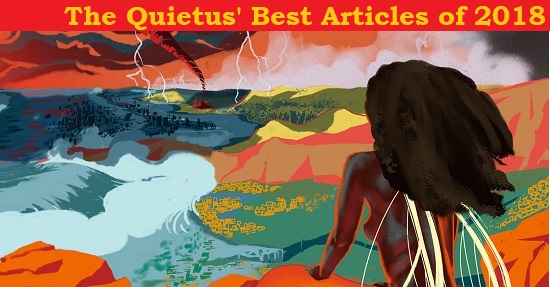During a second listen to the title track on An Angel Fell, the latest release from Idris Ackamoor & The Pyramids, I suddenly recall the climactic scene in Blade Runner where Rutger Hauer as Roy Batty delivers his famous, William Blake-inspired speech: “Fiery the angels fell / deep thunder rolled around their shores / burning with the fires of Orc.” Batty is a renegade android, an escapee from one of Earth’s off-world colonies, who continually interrogates what it means to be human and is all the while hunted by a character whose own human-ness is in doubt.
Fallen angels, or visitors from other planets, seem to occupy a similar role on this album: they observe human follies, warn against our impulses to conflict and environmental destruction, and offer the possibility of redemption. That title track veers between tight orchestration and 50s B-movie sound effects, the Pyramids’ sextet of extraordinarily talented jazz voyagers bridging the gap between earthy rhythms and extraterrestrial soundscapes.
This is not the first time that otherworldly visitors have graced planet Earth via what has come to be known as cosmic jazz. In the movie Space Is The Place (made in 1972 – the same year that Idris Ackamoor & The Pyramids formed in Ohio), jazz visionary and Afrofuturist prophet Sun Ra lands his intergalactic Ra Ship in Oakland, California (which was home to the Pyramids during the mid-70s); having visited other planets where “the vibrations are different”, he expounds his theories of expanded black consciousness to the bemused young African-Americans he meets there.
This debt to Sun Ra’s legacy – both his music and his message – is explored fully on ‘Land Of Ra’, the captivating third track here, whose lyrics describe “a band of children from the land of Ra” who “travel space from star to star”. Like many of the album’s songs, it contains triumphant, almost euphoric passages and also delves into darker sonic realms. The track blends the heavily delayed guitar effects normally found in dub with its saxophone and violin-led melody, and it works perfectly. This playful borrowing from other genres is displayed across the album: opening track ‘Tinoge’ nods towards Afrobeat, ‘Papyrus’ glides into a kind of bossa nova kitsch.
The band started 46 years ago, disbanded for decades and then reformed, but their music has lost none of its potency or political relevance. The music that Ackamoor was making in the 1970s came out of intense social and racial tension, and that commitment to addressing the world’s ills through music remains. The arrival of the LP feels timely: Ackamoor stated that “loss of innocence and separation” were two themes guiding its development, as was a belief in the healing power of music. Humanity in 2018 could certainly use some healing, and it doesn’t feel like a coincidence that the return of politically engaged jazz has come at a time of renewed global conflict.
‘Soliloquy for Michael Brown’ confronts the continued brutality of racial oppression in the United States, honouring the African-American teenager whose killing by Missouri police in 2014 sparked great civil unrest. It begins with an astonishing interweaving of Ackamoor’s sax and Sandra Poindexter’s violin: the two instruments summon deep grief and militant rage, then morph into a percussive groove that is transformative in its intensity. Ackamoor’s sax playing here is wounded and abrasive, as if depicting the deep scars of the legacy of racial violence.
Social injustice isn’t the only issue tackled by the LP, whose album art (by illustrator Lewis Heriz) depicts an angel sitting atop a rock as storms engulf the landscape in front of her. The funk-laced ‘Message To My People’ warns of ecological oblivion, the ominous roar of distorted guitars in the background. The track follows in the tradition of militant jazz and funk: music as sermon, lament and battle cry.
Despite the heavy subject matter, the album feels optimistic and imbued with a belief in the potential for humanity’s transformation. An Angel Fell ends with the shimmering, dreamlike ‘Sunset’, a celebratory and transcendent piece which seems to point towards a renewed respect and appreciation of nature as being part of our salvation. Ultimately, this is what the album promises: redemption and collective healing are within our grasp, if only we look outward and inward to be reminded of our true place in the cosmos.


